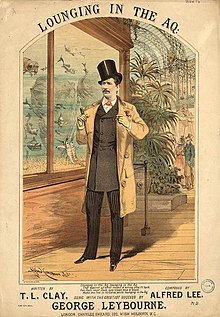George Leybourne
This article needs additional citations for verification. (December 2013) |
George Leybourne | |
|---|---|
 Lounging in the Aq (Royal Aquarium), sheet music cover by Alfred Concanen (1880) | |
| Born | George Leybourne 17 March 1842 |
| Died | 15 September 1884 (aged 42) |
| Other names | Champagne Charlie |
| Occupation | music hall vocalist |
George Leybourne (17 March 1842 - 15 September 1884) was a Lion comique of the British Victorian music hall who, for much of his career, was known by the title of one of his songs, "Champagne Charlie". Another of his songs, and one that can still be heard today, is "The Flying Trapeze", or "The Daring Young Man on the Flying Trapeze". His 1867 hit "Champagne Charlie" lead to the first major success of the music hall concept in Britain and even today he is still thought of as one of the most well known music hall performers.
Career
George Leybourne was born in Gateshead, however at an early age he and his family moved to live in London. Before he went on the music halls he worked as an engineer in, amongst other places, the South West of England. For his early music hall appearances in the North of England, including Liverpool and Newcastle he used the stage-name Joe Saunders a fact which, in the past, has caused much confusion as to his real name. His first documented appearance in London using his real name of George Leybourne was at the Bedford Music Hall in 1863, but it is known that he had appeared in some of the smaller East-End venues in the months before this.[1]
In 1866 with composer Alfred Lee, he wrote "Champagne Charlie", premiering it in Leeds in the August of that year. It took several months before it became the hit song which would be forever linked to George Leybourne’s name, a song which eventually became something of a mill-stone around his neck.
Another of Leybourne’s major song successes, also dating from 1866, was "The Flying Trapeze", music by Alfred Lee. The song celebrated the fascination with the many trapeze artistes then performing in the UK, including Leotard and his sensational appearances at the Alhambra Music Hall in London. In 1867 it was published in the USA by C. H. Ditson & Co, with music attributed to Gaston Lyle.
Leybourne evolved a new type of music hall artiste, the Lion Comique; a swell or attractive, fashionable, young man. In some of his songs he appeared immaculately dressed in white tie and tails, when he would declare his love for the high life, women, and champagne. However, he also sang many character songs, which were detailed studies of all classes of people, from low life to high life.
In 1868, when William Holland became manager of the Canterbury Music Hall, he employed Leybourne on an exclusive contract of £25 a week, providing him with a carriage drawn by four white horses. Over the next year by appearing, with Holland’s permission, at several other halls at the same time, his salary rose to £120 per week.
Leybourne also wrote the lyrics to the 1871 song "If Ever I Cease to Love", some of the lyrics of which caused a scandal. Today it is remembered for its association with Mardi Gras in New Orleans; it became the signature song for the Rex Krewe.
The song was sung by Lydia Thompson, in the burlesque adaptation of Offenbach's operetta Bluebeard, with which she was touring the United States. When he visited New Orleans in 1872, Russian Grand Duke Alexei Romanov saw Bluebeard and was fascinated by both the singer and the song. The king of Carnival directed that all bands in the Rex parade would play "the Royal Anthem", "If Ever I Cease To Love". It is still to be heard at the New Orleans Carnival.
When Jenny Hill performed at the London Pavilion, she stopped the show and forced Leybourne to wait for her act to finish. Such was his generosity that he carried her back on to the stage for an encore.
Leybourne and Alfred Vance, also known as The Great Vance, have always been seen as rivals, an opinion amplified by the 1944 film Champagne Charlie. But latest research shows that whereas during the same period they both sang songs extolling the virtues of various alcoholic drinks, their careers took slightly different paths. Leybourne concentrated on his music hall appearances, while Vance entertained middle-class audiences with ‘safe’ concert party shows; it was in their advertisements that the rivalry came to the fore. In the film Champagne Charlie, Leybourne was played by comedian Tommy Trinder, while Alfred Vance was played by Stanley Holloway.
During a career spanning 23 years Leybourne sang over 200 songs; however, towards the end of his career he failed to adapt to the changing times and his popularity declined. A victim of success and fast living, George Leybourne died penniless in Islington aged 42.
He is buried at Abney Park Cemetery in Stoke Newington, London with his grandson, daughter Florence and her husband, the music hall star Albert Chevalier. His headstone, with the epitaph, God's finger touched him and he slept was erected by fellow Music Hall legend Dan Leno, and the Grand Order of Water Rats. George Leybourne's grave is cared for by The Music Hall Guild of Great Britain and America.
The actor appeared at Wilton's Music Hall in London's East End, the world's oldest surviving grand music hall, and an adjoining modern residential apartment block has been named after him (Leybourne House).
See also
- Champagne Charlie—film based on Leybourne's life
References
- ^ Beeching, Christopher. The Heaviest of Swells. DCG Publications, 2011
